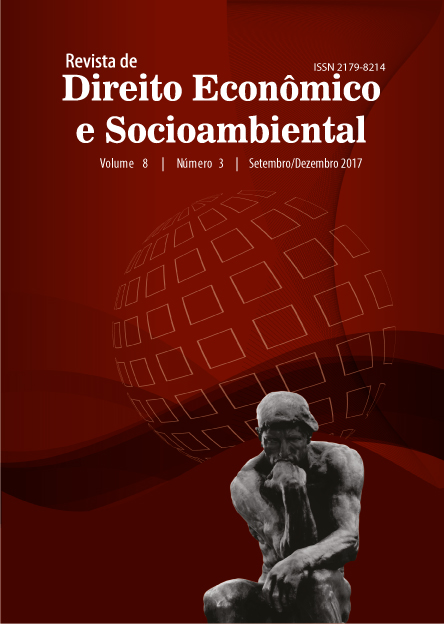Desenvolvimento (sustentável) e a ideia de justiça segundo Amartya Sen
DOI:
https://doi.org/10.7213/rev.dir.econ.soc.v8i3.7616Palabras clave:
desenvolvimento sustentável, teoria da justiça, inclusão social, governança, Amartya Sen.Resumen
O texto aborda o desenvolvimento (sustentável) e a Ideia de Justiça segundo Amartya Sen sob a perspectiva da tutela ambiental, do desenvolvimento econômico, da governança e especialmente da inclusão social. É procedida uma forte crítica ao utilitarismo e defendida a liberdade como o caminho para se alcançar o desenvolvimento (sustentável). No texto, a insuficiência do Produto Interno Bruto como único índice de mensuração do desenvolvimento é criticado sob perspectivas de desenvolvimento humano, tutela ambiental, desenvolvimento econômico e de governança. De acordo com o artigo, o desenvolvimento sustentável pode apenas ser alcançado juntamente com o desenvolvimento humano, proteção ambiental, desenvolvimento econômico e governança de modo harmônico e sempre com liberdade em um Estado Democrático de Direito.
Descargas
Citas
ARISTOTLE. Nicomachean ethics. Oxford: Oxford University Press, 1980.
ARROW, Kenneth; SEN, Amartya; SUZUMURA, Kotaro. Social choice and welfare. Oxford: Elsevier, 2011.
BOFF, Leonardo. Sustentabilidade. Rio de Janeiro: Vozes, 2012.
BROOKS, Arthur. Academia’s rejection of diversity. The New York Times, New York, 31 out. 2016. Disponível em: <http://www.nytimes.com/2015/10/31/opinion/academias-rejection-of-diversity.html?_r=0>. Acesso em: 15 nov. 2015.
CANNON, Jonathan Z. Environment in the balance: the green movement and the Supreme Court. Cambridge: Harvard University Press, 2015.
FREITAS, Juarez. Sustentabilidade: direito ao futuro. 3. ed. Belo Horizonte: Fórum, 2016.
GERRARD, Michael. Introduction and Overview. In: GERRARD, Michael. The law of clean energy: efficiency and renewables. New York: American Bar Association, 2011.
GORE, Albert. An inconvenient truth: the crisis of global warming. New York: Penguin Group, 2007.
HARDIN, Garret. The tragedy of the commons. Science, Washington, v. 162, p. 1243-1248, 1968.
KANT, Immanuel. A metafísica dos costumes. São Paulo: Folha de São Paulo, 2010.
KURLANSKY, Mark. A biography of the fish that changed the world. New York: Walker Publishing Company, 1997.
LOCKE, John. Second treatise of government. Indianapolis: Hackett Publisching Company, 1980.
LUKES, Steven; URBINATI, Nadia. Condorcet in political writings. Cambridge: Cambridge University Press, 2012.
MALTHUS, Robert Thomas. An essay on the principle of population. Mineola: Dover Publications, 2007.
MILL, John Stuart. On liberty and other writings. London: Cambridge Univesity Press, 2012.
MILL, John Stuart. On liberty and other essays. New York: Oxford University Press, 2008.
MILL, John Stuart. Bentham. Madrid: Tecnos, 1993.
NOZICK, Robert. Anarchy, state and utopia. Oxford: Blackwell, 1974.
POSNER, Richard A. How judges think? Cambridge: Harvard University Press, 2010.
POSNER, Richard. The crisis of capitalist democracy. Cambridge: Harvard University Press, 2010.
RAWLS, John. Justice as fairness: a restatement. Cambridge: Harvard University Press, 2001.
RAWLS, John. Political liberalism. New York: Columbia University Press, 2005.
RAWLS, John. A theory of justice. Cambridge: Harvard University Press, 1971.
ROUSSEAU, Jean-Jacques. Du contrat social. Paris: Flammarion, 2011.
SEN, Amartya. The idea of justice. Cambridge: Belknap Press of Harvard University Press, 2011.
SEN, Amartya. Development as freedom. New York: Random House, 1999.
SMITH, Adam. The wealth of nations. Hampshire: Harriman House, 2007.
STIGLITZ, Joseph. The great divide: unequal societies and what we can do about them. New York: W.W. Norton & Companhy, 2015.
STIGLITZ, Joseph E. The price of inequality. London: Penguin Books, 2013.
STIGLITZ, Joseph; SEN, Amartya; FITOUSSI, Jean-Paul. Mismeasuring our lives: why GDP doesn’t add up. New York: The New Press, 2010.
SUNSTEIN, Cass. The second bill of rights. New York: Basic Books, 2004.
TOMAIN, Joseph; CUDAHY, Richard. Energy law in a nutshell. 2nd ed. St. Paul: Thomson Reuters, 2011.
WEBER, Thadeu. Ética e filosofia política: Hegel e o formalismo kantiano. 2. ed. Porto Alegre: Edipucrs, 2009.
WILSON, Edward O. The future of life. New York: W. W. Norton & Company, 2012.
WORLD COMMISSION ON ENVIRONMENT AND DEVELOPMENT. Our common future: Brundtland report. Oxford; New York: Oxford University Press, 1987.
Descargas
Publicado
Cómo citar
Número
Sección
Licencia
Autores que publican en esta revista están de acuerdo con los siguientes términos:
- Autores mantienen los derechos autorales y conceden a la revista el derecho de primera publicación, con el trabajo simultáneamente licenciado bajo la Creative Commons - Atribución 4.0 Internacional, que permite compartir el trabajo con reconocimiento de la autoría y publicación inicial en esta revista.
- Autores tienen autorización para asumir contratos adicionales separadamente, para la distribución no exclusiva de la versión del trabajo publicada en esta revista (ej.: publicar en repositorio institucional o como capítulo de libro), con reconocimiento de autoría y publicación inicial en esta revista.
- Autores tienen permiso y son estimulados a publicar y difundir su trabajo online (ej.: en repositorios institucionales o en su página personal) a cualquier punto antes o durante el proceso editorial, ya que esto puede generar alteraciones productivas, así como aumentar el impacto y la citación del trabajo publicado (Véase El Efecto del Acceso Libre).





















